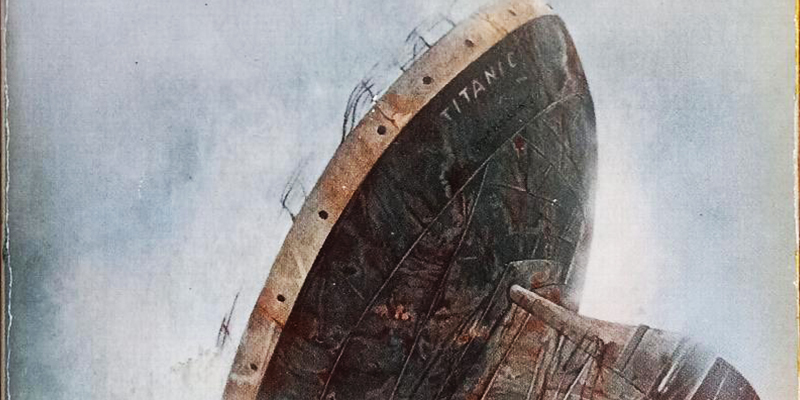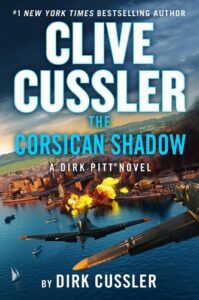In 1973, a paperback thriller was published by Pyramid Press, written by an aspiring writer from Southern California. The book opened with an antiquated World War I German Albatross biplane strafing Brady Air Force Base on the Greek island of Thásos, destroying its fleet of F-105 jet fighters. The attack is disrupted by the arrival of a lumbering PBY Catalina flying boat, whose pilot engages in an unlikely dogfight with the Albatross and somehow prevails. The Mediterranean Caper was the debut novel by my father Clive Cussler, and introduced the indomitable character of Dirk Pitt at the controls of the Catalina, along with his fictional employer, the National Underwater and Marine Agency (NUMA).
Coveted by collectors today, Pyramid published just 5,000 copies of The Mediterranean Caper. Despite its limited release, the book was nominated as the Best Original Paperback by the Mystery Writers of America. Although Clive didn’t win the award, the recognition helped launch his storied career as an action-adventure writer.
I was twelve years old when the book was published, and, like the rest of my family, I was thrilled to see a book with his name on the cover. Even more exciting was the fact that Clive had named the main protagonist in the story after ME! (I was less enamored with the inclusion of Pitt’s romantic interest, a woman named Teri, named for my older sister).
I realized that naming his main character Dirk may have been a payback of sorts for the insomnia my father caused me. Clive began writing at nights in my childhood bedroom, which shared space as the family den. Many nights I would fall asleep to the clacking of his aged Smith Corona typewriter as he pounded out manuscript pages.
When my father first took pen to paper to write an adventure story, he wanted to create a different kind of protagonist. Clive studied fictional heroes from established mystery series, including Sherlock Holmes, Hercule Poirot, Philip Marlowe, and even Mike Hammer. But he didn’t want a prototypical detective or spy, so he created Dirk Pitt to be a marine engineer who spent his life in and around the sea.
The result was a tall guy with thick black hair, a hard-featured face, and opaline green eyes. Pitt isn’t the handsomest of men and is a bit on the lean side, but like most alter egos, he is tough, courageous, and has an eye for beautiful women.
My youthful fantasies didn’t preclude me from realizing that Dirk Pitt wasn’t modeled after a young boy. No, my father had a clear inspiration for Pitt that wasn’t hard to see: it was himself!
Pitt reflects a great deal of my father’s personality—intolerant of needless rules and bureaucracy, yet ingrained with humor and generosity. They shared a love of history, antique cars, and sea mysteries, along with a penchant for tequila. And, of course, they both had a thirst for adventure.
With the publication of Caper, my father had hoped for nothing more than to continue writing a potboiler adventure series. But life changed with the publication of his third book, Raise the Titanic, which proved to be his breakout novel. Raise the Titanic shot up the international bestseller lists upon its release in 1976 and established Clive as one of the foremost writers of adventure fiction. It also spawned a lavishly produced but sadly ill-conceived film of the same name, which has rightly been consigned to the furthest reaches of cable television late at night.
Clive’s subsequent novels became fixtures on the bestseller lists, marred only by another failed venture in Hollywood with the 2005 film production of Sahara, starring Matthew McConaughey. (I see Rotten Tomatoes now has it at an aggregate rating of 38%, which may be a bit generous.) For a man blessed with great creative vision, it pained Clive that his works failed to translate successfully to the big screen. But he returned to what he knew best, and that was writing adventure fiction.
Beyond the Dirk Pitt adventures, Clive became the driving force behind four other action series, each benefitting from partnerships with talented co-authors. The NUMA Files, the Oregon Files, the Fargos, and the Isaac Bell series grew in popularity to nearly rival the Pitt books. At his death, my father had written or co-written over 85 books, a staggering volume of work. He had come a long ways from the backroom of a Southern California dive shop, where he penned his first novel between selling wetsuits and refilling empty dive tanks.
Clive’s writing enabled him to engage in real life maritime adventures focused on locating lost historic shipwrecks. In a nod to the fictional agency in the Dirk Pitt books, he created a non-profit organization called NUMA, dedicated to preserving America’s maritime and naval history. Among the nearly seventy wrecks found by NUMA was the Belgian transport ship Leopoldville. Originally a passenger liner and converted for use as a troopship in the Second World War, the Leopoldville was struck by a torpedo in the English Channel on Christmas Eve, 1944, near the coast of Cherbourg, France. As a result, 763 soldiers died in a wartime tragedy often overlooked in the history books.
Perhaps NUMA’s most celebrated discovery was the H.L. Hunley, the Confederate submarine that sank the Union ship U.S.S. Housatonic with a spar torpedo in 1864—the first submarine in history ever to sink a ship. The Hunley disappeared shortly thereafter, but in 1995 its preserved remains were discovered buried in the silt off the coast of Charleston, South Carolina. Raised in 2000 and currently under preservation in a Charleston museum, the Hunley represents one of the most remarkable artifacts dating from the Civil War.
Clive went on to document the efforts of NUMA in two non-fiction books, The Sea Hunters (a #1 bestseller) and The Sea Hunters II. And if that wasn’t enough, he also found time to pen two children’s books, The Adventures of Vin Fiz and The Adventures of Hotsy Totsy.
With the modest release of The Mediterranean Caper back in 1973, my father could never have foreseen the successful writing career that was on his horizon, nor the ongoing popularity of his literary hero Dirk Pitt. As a twelve-year old kid, I certainly didn’t envision the longevity of my namesake.
And I certainly never imagined that one day, I would be the one chronicling the fictional adventures of Pitt. Yet fifty years have passed in a heartbeat, and today I find my name upon the cover of The Corsican Shadow, the 27th entry in the Dirk Pitt series—and the tenth Pitt book I’ve had a hand in writing since 2004.
Pitt has always felt like something of a family member to me, perhaps even more so now in my father’s absence. But something tells me I’m not the only one who feels that way. The fictional guy who flew out of the clouds in a flying boat fifty years ago still seems to resonate with multiple generations of readers in a timeless manner.
The world has changed a great deal over those fifty years. But even in the midst of thousands of profound changes, Dirk Pitt has kept his bearings. A calm moral presence in a sea of ambiguity, Pitt remains sure of himself and ever-ready—even hungry—for the next challenge. Maybe in today’s increasingly disturbing and tumultuous world, we need a heroic force for good like Dirk Pitt as much as that day in 1973 when he first appeared.
Or, maybe, MORE than ever before.
***


















